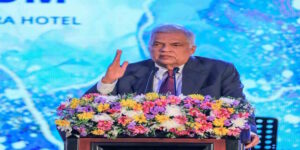Colombo, July 15 – President Ranil Wickremesinghe said that the Sri Lankan government would want to see the Indian rupee (INR) be used as much as the US dollar in the South Asian island nation.
“It makes no difference to us if the INR becomes a common currency. We’ll have to figure out how to go about it,” Sri Lanka’s head of state said while participating as the chief guest at the ‘Indian CEO Forum’ in Colombo.
Wickremesinghe said that Sri Lanka must become more open to the outside world. “We must be competitive not just for Sri Lanka, but also for the rest of Southeast Asia, East Asia, and Australia,” the Sri Lankan President emphasised.
Ahead of his first official visit to India on July 20, Wickremesinghe reiterated that the main aim of his visit is to strengthen the bond between the two countries. “During my visit to India, my primary objective will be to explore connectivity, as High Commissioner Gopal Bagley aptly stated. We need to determine our long-term objectives and aspirations for the next 10 to 15 years. This marks the beginning of a new era, and we must forge ahead together,” Wickremesinghe said.
Stressing the need to be guided by the vision of Indian Prime Minister Narendra Modi under whose leadership the South Asian giant nation is going through a major development process, Sri Lankan President said: “The world is evolving, and India is undergoing rapid development, particularly under Prime Minister Modi’s leadership.”
“It’s essential to remember that development doesn’t halt in India. In the next 50 years, it will extend to Africa and beyond. Therefore, the vision we discussed with Prime Minister Modi should guide our immediate actions. Ultimately, it’s crucial to recognise that the relationship between our countries is not solely driven by governments but by our people, who are moving forward at a rapid pace. We must adapt to the changing world, avoiding the pitfalls that come with government intransigence. Hence, we must foster a long-term relationship between our two nations, transcending individual leaders or political parties. Together, India and Sri Lanka possess immense potential, and it is our path forward,” he added.
Referring to Sri Lanka’s ongoing economic crisis and the need to join India’s progress, Wickremesinghe said: “As our economy recovers, we must prioritise economic restructuring. We initially made progress, but our pace has slowed. Once we complete the debt restructuring process, our focus will shift towards a comprehensive growth agenda. This entails a massive overhaul of our economy, legal framework, and systems, aligning our path with that of India.”
Hailing India’s rapid development, he said that Sri Lanka could be benefited from its geographical positioning closer to India. “Positioned strategically in the middle, Sri Lanka benefits from its proximity to India, coupled with a rich history, cultural heritage, and longstanding trading relationships spanning 2,500 years.”
He further said that by the late 19th century, “India accounted for only 1 per cent of the world’s GDP. However, with the shift of economic power towards Asia, India has once again risen to prominence. Just as East Asia, including countries like Japan, Korea, and China, witnessed significant growth 75 years ago, it is now India’s turn, along with the Indian Ocean region. It’s important to note that India is not the sole nation rising in this context; the oil countries in West Asia are also on the ascent”.
Speaking at the event, Indian High Commissioner to Sri Lanka Gopal Bagle recalled the support extended by India and its business community, especially during the last year’s economic crisis.
“During last year’s financial crisis, India and the Indian business community helped Sri Lanka’s economy recover. Sri Lanka is now recuperating from the financial crisis… The Government of India and the Indian business community both supported it in this regard. Even during the initial crisis, Indian businessmen began doing business in Sri Lanka to demonstrate to the rest of the world that the country’s financial status is stable,” the High Commissioner stated.












